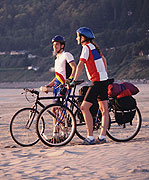July 22, 2014

 By Randy DotingaHealthDay Reporter
By Randy DotingaHealthDay Reporter
Latest Cancer News
FRIDAY, July 18, 2014 (HealthDay News) — A new study fuels the ongoing debate over the health risks of bicycle riding for men: Researchers found that cyclists who bike more may face a higher risk of prostate cancer, but not a greater chance of infertility or erectile dysfunction.
The findings aren’t definitive, and they conflict with previous research on impotence and infertility. Other experts pointed to the study’s weaknesses, and lead author Dr. Milo Hollingworth, a research associate at University College London, acknowledged that the findings are “difficult to interpret.”
“Men shouldn’t worry about increasing their risk of prostate cancer by cycling,” he stressed. “Men should cycle as much as they did before. The benefits for your heart, lungs, whole body and mental health are much more important.”
Previous research has suggested that bike riding for more than three hours a week boosts the risk of mild to moderate erectile dysfunction, said Dr. Chris Oliver, a consultant orthopedic surgeon with the Royal Infirmary of Edinburgh in Scotland. Other studies have also linked bike riding to infertility in men.
In the new study, researchers surveyed more than 5,000 male cyclists from 2012 to 2013.
Eight percent of the men reported erectile dysfunction problems, although they weren’t more common in men who biked more. The investigators did find links between erectile dysfunction and three factors — high blood pressure, smoking and older age.
The researchers didn’t find any link between more cycling and more cases of infertility, which 1 percent of the men reported.
As for prostate cancer, just under 1 percent of the men overall reported being diagnosed with it. Those who biked the most, more than 8.5 hours a week, were much more likely to have prostate cancer than the other men, although the study doesn’t prove there’s an actual connection between the two.
Of the 498 men who biked the most, 17 said they had prostate cancer (3.5 percent). Of those who biked the least, three out of 511 (0.5 percent) said they had prostate cancer, the findings showed.
The trends held up after the researchers adjusted their statistics so they wouldn’t be thrown off by factors such as large or small numbers of men of certain ages.
What should men do? “Don’t stop cycling because of this study,” said Oliver, the surgeon in Scotland. The study is small, “not statistically significant” and based on anonymous responses from the Internet.
However, he did recommend that men get a good bike seat, known as a saddle. Bike seats have been implicated in infertility and erectile problems caused by bike riding, and bike seat manufacturers have tried to design better seats.
“Don’t worry about this study,” Oliver said. “Just keep riding.”
Lauren Wise, an associate professor of epidemiology at the Boston University School of Public Health who studies the causes of infertility, said the study has potential weaknesses. For one thing, “regular bikers who volunteered for this study are probably less likely to have a history of infertility or erectile dysfunction because if they had experienced those events they would be less likely to continue biking,” she said.
She also cautioned that the study doesn’t prove a cause-and-effect relationship between biking and prostate cancer. And, she said, the number of cases of prostate cancer — 36 out of 5,282– is small, and the apparent links to cycling time could be only due to chance.
The study appeared in the July 11 issue of the Journal of Men’s Health.
 Copyright © 2014 HealthDay. All rights reserved.
Copyright © 2014 HealthDay. All rights reserved.
SOURCES: Milo Hollingworth, B.Sc., M.B.B.S., physician, Great Western NHS Trust, and research associate, University College London; Chris Oliver, M.B.B.S., consultant orthopedic surgeon, Royal Infirmary of Edinburgh, Scotland; Lauren Wise, Sc.D., associate professor, epidemiology, Boston University School of Public Health; July 11, 2014, Journal of Men’s Health
![]()